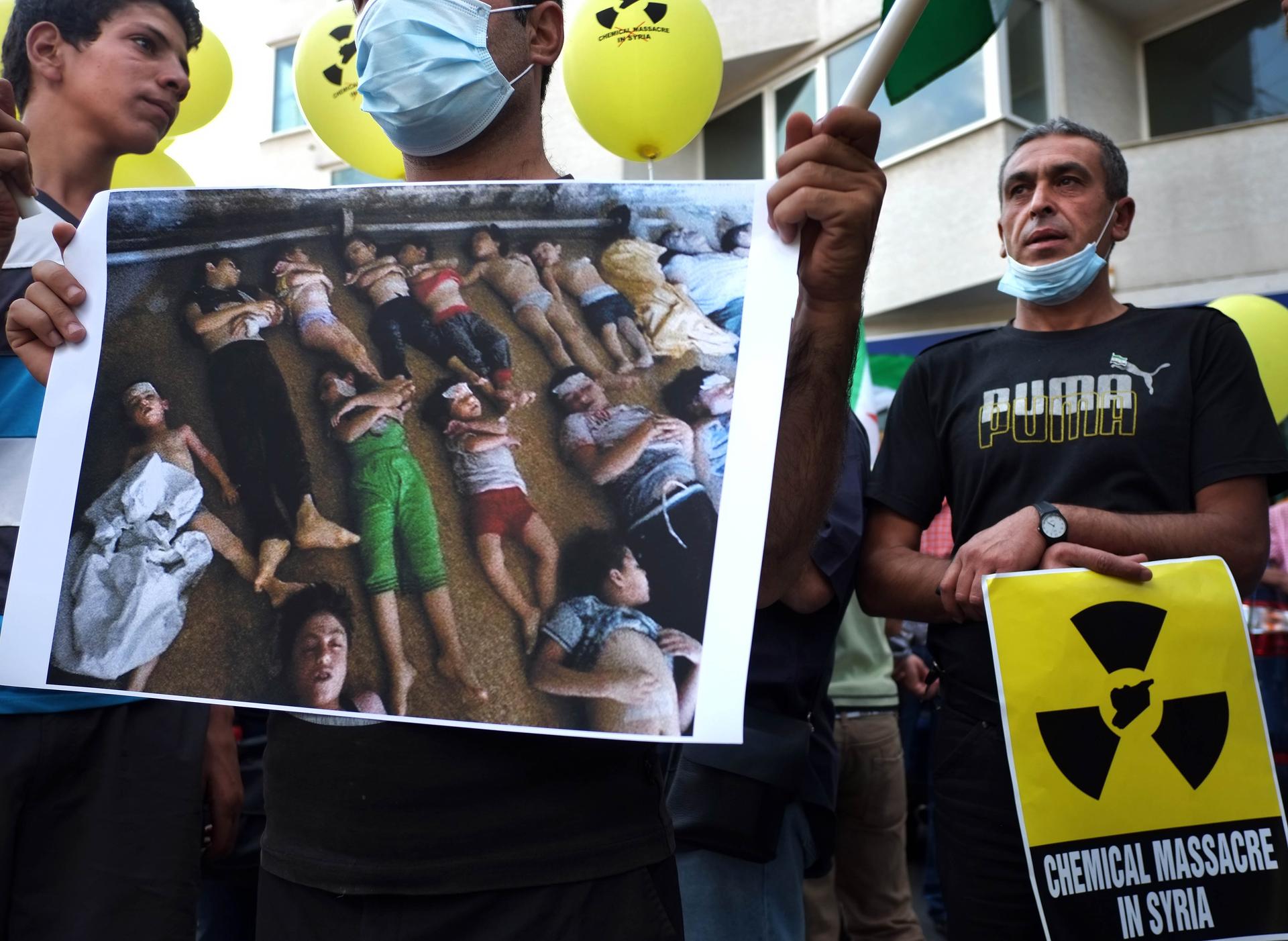Sniper fire targets UN investigators at alleged gas attack site
Syrian immigrants living in Bulgaria hold a photo showing the bodies of men, women and children allegedly killed in a chemical attack east of Damascus as they protest against the regime of Syrian President Bashar Al-Assad and the use of chemical weapons, on August 23, 2013, in front of the Syrian Embassy in Sofia.
United Nations special weapons investigators came under attack by snipers Monday morning as they arrived in Moadamiyeh, a western suburb of Damascus and one of the areas where an alleged gas attack occurred, to meet with doctors and victims in a makeshift hospital.
No serious injuries were immediately reported, although one UN car was hit. UN inspectors initially turned back to the government checkpoint, but returned to the site shortly thereafter.
Martin Nesirky, a spokesman for UN secretary general Ban Ki-moon, said earlier today that the vehicle had been “deliberately shot at multiple times,” in an area between rebel and government controlled territory.
Syrian state television claimed an anonymous government source said “terrorists,” a term the government uses regularly to refer to opposition fighters, were behind the attack.
Government security forces accompanied the investigation brigade this morning, in an effort to protect them from rebel forces, while the Syrian opposition last week also vowed to keep any investigators safe during their work.
The trip to the alleged gas site came after this weekend’s promise by Syrian President Bashar al-Assad to grant access to UN investigators.
The international community, however, says access was granted too late and was still not enough.
British Foreign Secretary William Hague said Monday that access had not been “unimpeded” as it was restricted to a “certain number of hours.”
A senior Obama official said that there remains “very little doubt” that Assad’s regime used chemical weapons, and although there has not yet been a decision on whether or not the US will take military action, the Syrian promise to allow access to Ghouta—five days after the attack—was “too late to be credible.”
Western countries, including Britain, the Independent reported, are gearing up for “unilateral military action against the Assad regime within two weeks in retaliation for its alleged use of chemical weapons on civilians in Syria.”
In a 40-minute phone call with President Obama on Saturday night, British Prime Minister David Cameron reportedly discussed launching missile strikes against “key regime targets.” A second round of missile strike conversations purportedly took place on Sunday with French President François Hollande.
"We cannot in the 21st century allow the idea that chemical weapons can be used with impunity and there are no consequences," Hague said.
But Russia’s foreign minister, Aleksandr K. Lukashevich, has urged the international community not to prejudge the results of the UN inspection.
“In these conditions, we again resolutely call on all those who are trying to impose the results of the UN investigations and who say that armed actions against Syria is possible to show common sense and avoid tragic mistakes,” Lukashevich said in a statement released on the ministry’s website.
Assad also warned that US military intervention in Syria would bring “failure just like in all the previous wars they waged. Starting with Vietnam and up to the present day.”
“If someone dreams about turning Syria into a puppet of the West, it simply will not happen,” Assad told Russian news agency Izvestia. “We are an independent government, and we will battle with terrorism and we will freely build relations with those countries whom we want to. America has taken part in many wars but could not once achieve its political goals for which the wars were started. Yes, it is true, the great powers can wage wars but can they win them?”
Russia’s Foreign Minister Sergey V. Lavrov on Monday emphasized that even a Western strike on Syria would not initiate Russian military action. “We have no plans to go to war with anyone,” he told Reuters.
Every day, reporters and producers at The World are hard at work bringing you human-centered news from across the globe. But we can’t do it without you. We need your support to ensure we can continue this work for another year.
Make a gift today, and you’ll help us unlock a matching gift of $67,000!
